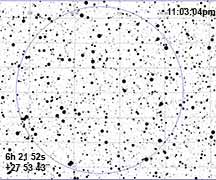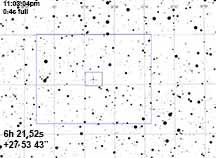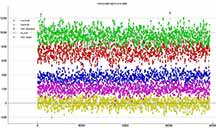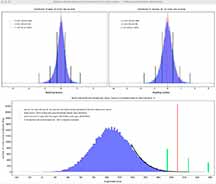

Kirk and I were a bit less than an asteroid radius apart.
This is a short, difficult event, but convenient in time and place in the sky. We could get lucky and it may look bright enough to get a detectable and solid event. Kirk's on the northern limit, I'm barely inside the 1-sigma zone. We'll try it from home
Alt=59 in Gemini
 |
 |
Kirk and I were a bit less than an asteroid radius apart. |
I got a recording at 8x. Noisy, as expected for this faint target at short integration. I see no evidence of an occultation, and likely a miss.
I got a .4 sec event for 2002 VR101, 8x from home, but the best I could get on the NIE test is between 3 and 4 sigma. First I tried several static mask apertures, they all failed 3 sigma. Then I tried the same but with appsum values instead of signal, and only one of them barely passed 3 sigma. Then I tried a TME aperture, signal failed 3 sigma but appsum passed 3 sigma better than the static appsum, so that's what I'll report.
 |
Looks like a positive; brief, at the right time. |
 |
 |
 |
magDrop report: percentDrop: 28.1 magDrop: 0.359 +/- 0.108 (0.95 ci)
DNR: 3.61
D time: [07:03:03.9609]
D: 0.6800 containment intervals: {+/- 0.0349} seconds
D: 0.9500 containment intervals: {+/- 0.0903} seconds
D: 0.9973 containment intervals: {+/- 0.1818} seconds
R time: [07:03:04.3613]
R: 0.6800 containment intervals: {+/- 0.0349} seconds
R: 0.9500 containment intervals: {+/- 0.0903} seconds
R: 0.9973 containment intervals: {+/- 0.1818} seconds
Duration (R - D): 0.4004 seconds
Duration: 0.6800 containment intervals: {+/- 0.0523} seconds
Duration: 0.9500 containment intervals: {+/- 0.1192} seconds
Duration: 0.9973 containment intervals: {+/- 0.2255} seconds